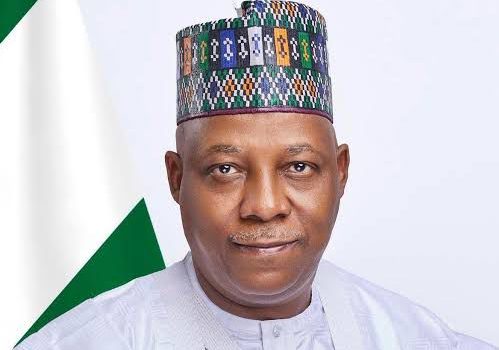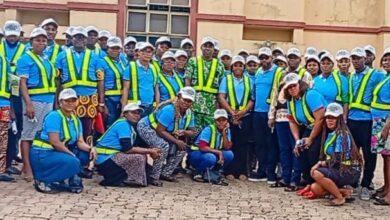Corruption is Nigeria’s greatest threat, not federalism – VP Shettima |

Vice President Kashim Shettima, has asserted that corruption, not the absence of true federalism, is the major problem confronting Nigeria as a country.
Shettima stated this as the Keynote speaker at the 17th Edition of the Leadership Annual Conference and Award, held at the State House Banquet Hall, Abuja, on Tuesday.
He also listed the mismanagement of the country’s resources as another factor that has retarded the nation’s progress over the years.
The Vice President also faulted those who believe the nation’s federalism is not working, saying there is no perfect federalism worldwide.
Shettima, represented by the Special Adviser to the President, Special Duties, Aliyu Modibbo Umar, said: “The problems we attribute to our federal system often stem from the poor management of what is already within our grasp, not from any inherent flaw in our constitutional architecture.
“The issue is not merely how much each federating unit accrues but how judiciously such resources are utilised.
“Distinguished ladies and gentlemen, this administration, under the leadership of His Excellency President Bola Ahmed Tinubu, is confronting this challenge directly. We have chosen the path of reform.
“It is bold, often difficult, but necessary. One such step is our unflinching pursuit of local government autonomy, a vision we realise through the sanctity of due legal process.
“The recent Supreme Court pronouncements in favour of autonomy underscore our commitment to building a federal structure that works for the grassroots. This is how we make the federation functional: by bringing governance closer to the people.
“To those who argue that Nigeria’s federalism is fundamentally flawed because of its fiscal nature, I urge caution. Federalism, as practised around the world, is not a one-size-fits-all system.
“There is no universal template. Each country’s federal arrangement is shaped by its history, culture, and political experience.
“In Canada, for instance, federalism emerged as a compromise between linguistic groups. In Germany, the structure was initially so decentralised that consensus from all 16 Länder was required to pass national policies until reforms in 2006 shifted powers for greater efficiency. Spain, despite its fiscal concessions to regions like the Basque Country and Navarre, still contends with separatist agitations.
“What these examples show is that no federal system is perfect. Every federation evolves, reforming to meet its unique realities. Nigeria is no exception.
“We must resist the temptation to romanticise foreign systems or prescribe imported solutions that fail to account for our distinct social, ethnic, and demographic complexities.
“What we seek, therefore, is not a photocopy of another country’s model but a federal structure tailored to our aspirations. It must reflect our values, ensure accountability, and foster development at all levels.
“The only road to such a destination is through sincere dialogue, and this conference is a laudable example.
“The policy choices pursued by this administration, the removal of fuel subsidies to the introduction of tax reform bills-are aimed not only at guaranteeing a fiscally responsible federation but also at creating a system that offers each state both increased allocations and the opportunity to participate in debates and reforms for long-term fiscal stability.
“Our national experience has shown, time and again, that the greatest threats to our progress have stemmed from the mismanagement of resources and corruption.
“What matters most to everyday Nigerians-whether in Asaba or Sokoto-is not the abstract theory of federalism but whether governance delivers water, electricity, schools, roads, and hospitals.
“So, while we compare notes on how to improve our federalism, we must not lose sight of the dysfunctions that have been allowed to fester under the current system. If we at the national level deliver on our promises.
“If our governors manage their allocations with prudence, if our local governments are truly autonomous and accountable, if every kobo is deployed with the people’s interest in mind, then the structure will serve us well.”
The Vice President also reflected on the essence of the award and enjoined the recipients to be inspired by the honour to do more to move the country forward.
He said that the awards conferred to honourees should not be mere decorations but reminders of duty fulfilled and of paths charted in service to the country.
“These honours must inspire in us a deeper sense of responsibility to be part of the reforms we seek and to become architects of the fiscal accountability we so urgently need,” he said.
Shettima stated further that when leaders gather to deliberate on the state of the nation, they are reminded of the intellectual capital that powers the country, and the Conference and Award was no different.
According to him, “While it is a profound honour to reflect on the essence of this occasion, the opportunity to engage in a conversation aimed at rethinking Nigeria’s federal system is both timely and necessary.
“I look forward to the depth and diversity of perspectives from our distinguished participants.”
He said that the annual gathering, championed by Leadership Newspaper, has earned its place as a platform where ideas are exchanged and legacies are shaped.
Senator Shettima said the theme of the conference, “Challenges and Opportunities in Nigeria’s Fiscal Federalism,” captured both the urgency of the present and the promise of the future, adding, “It is equally fitting that we are here to celebrate individuals and institutions that embody excellence in service and leadership.”
He advised, “These honours must inspire in us a deeper sense of responsibility to participate in the reforms we seek and to become architects of the fiscal accountability we so urgently need.”
The Vice President said there is no doubt that the Nigerian challenge, when carefully considered, lies less in the structure of its federalism and more in the deficit of the collective fiscal responsibility.
Also delivering a goodwill message, the Attorney General of the Federation and Minister of Justice, Lateef Fagbemi, SAN, emphasised the federal government’s commitment to press freedom in the country.
He noted that his presence at the event represented a clear statement from the Federal Republic of Nigeria, particularly under the leadership of President Bola Tinubu, regarding the importance of safeguarding press freedom.
“My being here as Attorney-General of the Federation is also a statement of the Federal Republic of Nigeria, particularly under the able leadership of President Bola Ahmed Tinubu, and we also have the Vice President here, that we do not tamper with press freedom,” he said.
Fagbemi congratulated Leadership on its two decades in the media industry.
“Just a few years after the organisation was established, the idea emerged to provide a panoramic view of performances across states and sectors, allowing us to honor those contributing to the nation’s development,” he noted.
Speaking after receiving the Governor of the Year 2024, the Kano State governor, Alhaji Abba Kabir Yusuf, said he never lobbied for the award.
The Governor explained that a transparent selection team decided to come up with the names of the awardees.
He said that the award would spur him to put more effort into delivering the dividends of democracy even as he dedicated the award to vulnerable children in Nigeria.
In her remarks, Chairman of Leadership Group, Mrs Zainab Nda-Isaiah, called for a shift in how excellence is celebrated in Nigeria, urging that national awards should serve not only as recognition of achievement but also as a catalyst for broader inspiration.
Mrs Nda-Isaiah said the ceremony was not just about applause but about awakening the nation’s collective responsibility to strive for greater impact.
“I don’t think awards and accolades should be about recognition alone,” she said. “More than that, they should also be about inspiration, especially in a harsh global economy where dog-eat-dog is the norm.”
The annual event, which coincided with the 20th anniversary of Leadership Newspapers, brought together top government officials, business leaders, innovators and thought leaders under the theme “The Challenges and Opportunities in Nigeria’s Fiscal Federalism.” Vice President Kashim Shettima delivered the keynote address.
In her welcome speech, Mrs Nda-Isaiah paid tribute to the organisation’s late founder and her husband, Sam Nda-Isaiah, who established the media group in 2004 with a vision rooted in service and patriotism.
“Twenty years ago, our founding chairman ventured into newspaper publishing with a big idea — For God and Country. That vision continues to guide us, and by the grace of God, it will be passed on to the next generation,” she said.
She described the ceremony as a moment to honour the achievements of this year’s award recipients and challenge every Nigerian to reflect on their own contributions to nation-building.
“These outstanding leaders, each one a trailblazer in their own right, remind us of the power of big ideas, resilience, and compassion.
“They inspire us to make a difference — a difference that means food on the table for many, and contributions that improve lives in real communities.”
She said the event serves as a reminder of the enduring need to recognise individuals and institutions that continue to push boundaries and uphold values that strengthen the nation’s democratic and economic foundations.
Mrs. Nda-Isaiah concluded by thanking sponsors and supporters of the event, encouraging attendees to take the day’s reflections beyond the hall.
“As much as we celebrate those being awarded today, each of us has the potential to be a catalyst for change,” she said. “Let us continue to inspire — and inspire one another.”
Some of the awardees were the governor of Enugu State, Peter Mbah, who bagged the Governor of the Year Award; Governor Umo Eno of Akwa Ibom, Umar Namadi, Abba Yusuf of Kano, Bala Mohammed of Bauchi, and Senator Ademola Adeleke of Osun.
Minister of the Federal Capital Territory, FCT, Nyesom Wike, was awarded the Outstanding Person in Governance and Infrastructure Award; Alhaji Aliko Dangote was awarded the Person of the Year 2024 Award; the General Managing Director/Chief Executive Officer of Zenith Bank, Dame Adora Umeoji, was awarded Banker of the Year 2024; and Her Majesty, Olori Atuwatse 111, Queen of the Warri Kingdom, was awarded Social Impact Person of the Year 2024.
The Comptroller-General of the Nigeria Customs Service, Alhaji Bashir Adewale Adeniyi, was given Public Service Person of the Year 2024, Senator Adams Oshiomhole, Politician of the Year 2024, among others.
END.
Post Views: 1






